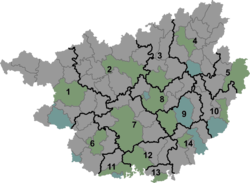Bama Town, Guangxi
Bama Town
巴马镇 | |
|---|---|
| Coordinates: 24°08′51″N 107°15′33″E / 24.147441°N 107.259297°E | |
| Country | People's Republic of China |
| Autonomous region | Guangxi |
| Prefecture-level city | Hechi |
| Autonomous county | Bama Yao Autonomous County |
| Area | |
| • Total | 247 km2 (95 sq mi) |
| Population (2018) | |
| • Total | 87,000 |
| • Density | 350/km2 (910/sq mi) |
| Time zone | UTC+08:00 (China Standard) |
| Postal code | 547500 |
| Area code | 0778 |
Bama (simplified Chinese: 巴马镇; traditional Chinese: 巴馬鎮; pinyin: Bāmǎ Zhèn) is a town in Bama Yao Autonomous County, Guangxi Zhuang Autonomous Region, China.[1] As of the 2018 census it had a population of 87,000 and an area of 247-square-kilometre (95 sq mi). There are Zhuang, Han, Yao, Mulao and Maonan nationalities living here.[2]
Administrative division
[edit]As of 2015, the town is divided into four communities and fourteen villages:[3]
- Chengdong Community (城东社区)
- Chengzhong Community (城中社区)
- Chengnan Community (城南社区)
- Chengbei Community (城北社区)
- Bama (巴马村)
- Bafa (巴发村)
- Baliao (巴廖村)
- Shezhang (设长村)
- Panyang (盘阳村)
- Fafu (法福村)
- Lianxiang (练乡村)
- Poteng (坡腾村)
- Bading (巴定村)
- Cifu (赐福村)
- Naba (那坝村)
- Longhong (龙洪村)
- Jiemo (介莫村)
- Yuanji (元吉村)
Geography
[edit]The town borders Fenghuang Township in the north, Dahua Yao Autonomous County in the east, Natao Township in the south, and the townships of Jiazhuan, Yandong and Xishan in the west.
The Panyang River (盘阳河) flows through the town west to east.[4]
There are two major reservoirs in the town, namely the Bading Reservoir (巴定水库) and Enzhu Reservoir (恩助水库). Bading Reservoir covers a total catchment area of 9 km2 (3.5 sq mi) and has a storage capacity of some 470 m3 (17,000 cu ft) of water.[5] Enzhu Reservoir can hold up to 129.7 m3 (4,580 cu ft) of water at full capacity.[6]
Demographics
[edit]| Year | Pop. | ±% |
|---|---|---|
| 2005 | 57,874 | — |
| 2015 | 86,000 | +48.6% |
| 2018 | 87,000 | +1.2% |
| Source: [7] | ||
The population of Bama, according to the 2018 census, is 87,000.[2]
Economy
[edit]The town's economy is based on nearby mineral resources and agricultural resources. The main varieties of crops are rice, soybean, corn and hemp. Diabase, titanium, manganese, copper, mineral water and gold are the six major minerals in the town.[1]
The Bama miniature pig (巴马香猪) is a local specialty pig.[1]
Education
[edit]- Bama No. 1 High School
Tourist attractions
[edit]The Longevity Museum (长寿博物馆) is a museum in the town.
The Bama Yao Autonomous County National Stadium is a gymnasium in the town.
The Mujishan Park (母鸡山公园) is a public park located in the town.
Transportation
[edit]The Provincial Highway S209 passes across the town northwest to southeast.
The National Highway G323 travels through the town northeast to southwest.
References
[edit]- ^ a b c Luo Guangqin 2008, p. 40.
- ^ a b 巴马镇将获200万,凭什么被评为2018年广西养生养老小镇!一起来看看. Sohu (in Chinese). 2018-10-18.
全镇占地面积247平方公里,共辖14个村186个自然屯285个村民小组及4个社区105个小区,总人口8.7万人,境内聚居壮、汉、瑶、仫佬、毛南等五个民族。
- ^ 行政区划 [Administrative division]. bama.gov.cn (in Chinese). 2018-11-22.
- ^ Luo Guangqin 2008, p. 41.
- ^ Luo Guangqin 2008, p. 115.
- ^ Luo Guangqin 2008, p. 116.
- ^ Luo Guangqin 2008, pp. 7–8.
Bibliography
[edit]- Luo Guangqin, ed. (2008). 《巴马瑶族自治县概况》 [General Situation of Bama Yao Autonomous County] (in Chinese). Beijing: Nationalities Publishing House. ISBN 978-7-105-08610-8.

